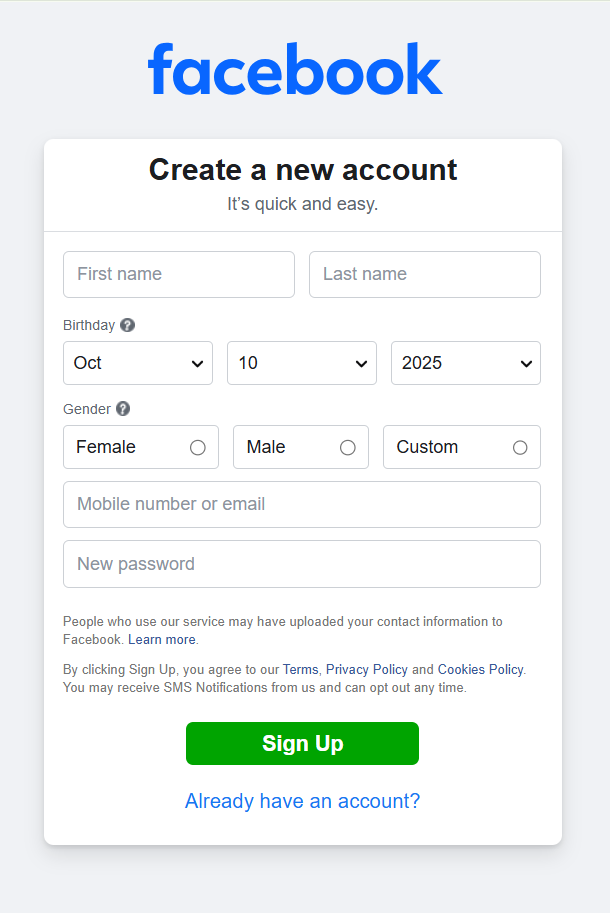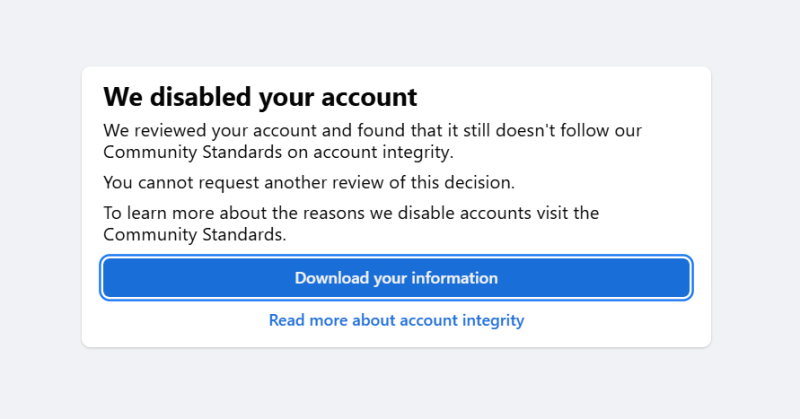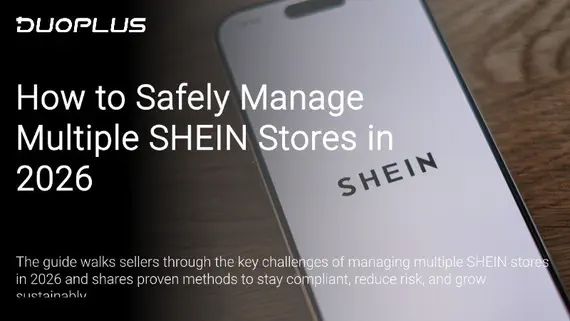Facebook, as the leading social media platform globally, has billions of active users and profoundly impacts global communication, information dissemination, and business activities. Whether for personal socializing or business marketing, having your own Facebook account is fundamental to enjoying the platform's traffic flow. However, many users, especially new users, often face a common question: Why is my newly created Facebook account so easily restricted?
Complete Registration Process for Facebook Account
1. Overview of the Registration Steps
To successfully create a Facebook account, you must follow a proper registration process. Although the steps may seem simple, each link is crucial to the account's future security:
- Visit the Platform: Register through the official Facebook website (https://www.facebook.com/
) or download the official app to proceed with registration.
- Input Personal Information: Accurately enter your real name, email address, or phone number. Please ensure to use valid information, as this is the first step to establishing a credible account.
- Set a Password: Create a strong password. A strong password typically includes a mix of uppercase and lowercase letters, numbers, and special characters, and is sufficiently long (recommended 12 characters or more) to ensure account security.
- Fill in Basic Information: Select your date of birth and gender. Please choose based on actual circumstances.
- Verification Code Challenge: Complete the verification code challenge, which is a crucial security measure to ensure that you are not a machine and to protect human registrations.
- Complete Registration: Click the "Register" button and follow the prompts to complete the personal information setup, such as uploading a profile picture, writing a brief introduction, etc., to enhance your account's credibility.

2. Key Points to Note During Registration
During the registration process, there are several key points that require special attention, which directly relate to the long-term stability of the account:
- Use Real Names and Information: Facebook has a strict real-name system. Using fake names or information during registration, even if successful, can easily lead to future restrictions, resulting in account bans.
- Email Selection: Avoid using temporary email addresses or unclear email sources. Statistics show that Gmail and Outlook are the most commonly used registration emails, but in recent years, Facebook has tightened its review of email accounts, especially newly registered Gmail accounts, which can lead to account marking or restrictions. Therefore, choosing a well-documented, reliable email is crucial, and sometimes it may be advisable to use a dedicated email service for business or specific scenarios.
- Phone Number Registration: It is not recommended to use a phone number directly to register a Facebook account. While it is possible to register, subsequent verification still requires email verification, and using a phone number for registration can easily expose your geographical location information, which may increase the risk of account being flagged or restricted.
Why Might Your Facebook Account Be Restricted?
Regardless of whether it is a social media account, gaming platform, or other online services, users need to familiarize themselves with the usage rules and practices of each platform to maintain a good online experience. Understanding the common reasons for account restrictions is key to preventing issues.

1. IP Environment Issues
Simply put, an IP address (Internet Protocol Address) is like your "door number" in the online world, used to identify your internet connection location. The IP environment refers to the specific characteristics associated with this IP address, such as geographical location, network type (home broadband, mobile, telecom, school, company, etc.), proxy type, etc.
When you log into or operate your Facebook account from an IP address that is not consistent with your actual location, or if it is flagged as high-risk or unstable, Facebook's security system will treat it as abnormal behavior, which may trigger security alerts, leading to temporary restrictions on your account.
While VPN (Virtual Private Network) can hide your real IP address, helping users maintain privacy or bypass geographical restrictions, if used improperly or if a non-reliable VPN service is selected (such as free VPNs), it may expose your account to security risks. Many free VPNs often lack sufficient security and encryption technology, making them vulnerable to black hat attacks or data leaks, which can also lead to unstable internet connections, making it impossible to access necessary content. For users requiring cross-border services, it is recommended to directly use IP proxy services
or build your own network environment.
2. Differences in Using Facebook APP and Web Version
There are noticeable differences in creating and using a Facebook account between the APP and web version, and these differences can directly affect the account's security and stability.
Facebook APP
- Advantages: Fast operation, timely notifications, complete functionality
- Risks: Automatically collects device information (IMEI, MAC address, etc.), which may trigger device identification
- Recommendations: It is advisable to complete the initial account creation on the web version before using the APP
Web Version of Facebook
- Advantages: Better privacy, does not collect device hardware information
- Risks: Cookies are prone to loss, requiring maintenance of login status, which may trigger human verification
- Recommendations: Suitable for initial account creation and usage
When using the Facebook APP, it is recommended to download the official version from the app store and ensure that unnecessary permissions are not granted, as some user experiences may indicate that if the web version frequently encounters restrictions, it may also be possible to complete the registration process in the APP.
3. Unusual Account Activity Risks
If your Facebook account is restricted shortly after registration, it is generally due to unusual account activity leading to restrictions. Facebook's social interaction algorithm monitors user interactions, and accounts may be flagged under the following conditions:
- Adding too many friends within 24 hours (over 50)
- Sending a large number of messages to non-friends
- Frequently joining or leaving groups
- Posting similar comments across multiple unrelated threads
How to Prevent Your Facebook Account from Being Restricted?
Establish a Secure Registration Environment
- Choose a Reliable Internet Service Provider (ISP)
Select a reliable ISP that ensures stable and secure internet connections. Quality ISPs typically provide better security measures, reducing the risk of internet attacks.
- Maintain a Consistent IP Address
When registering a new account, try to use the same network environment, as fluctuations in IP address can trigger security alerts, leading to temporary restrictions or limited access. Therefore, maintaining a consistent IP address can help enhance the credibility of your account. If you need to change networks, it is advisable to space out the changes to at least 12 hours to reduce the risk of being flagged as suspicious activity.
- Avoid Using Proxy Servers or VPNs for Important Accounts
While proxy servers and VPNs can provide external privacy protection, they can also make account login behavior unstable, increasing the likelihood of being flagged by the system as suspicious activity. Therefore, when using important accounts, it is best to use direct internet connections and real devices.
Integrate Facebook Functionality Usage
Step-by-Step Building Social Connections:
- First Week: Add 3-5 Real Friends Daily
In the first week after creating the account, focus on adding a small number of real friends, which can be acquaintances, colleagues, or other social media friends. Maintaining a good number of friends gradually can help Facebook's algorithm recognize your account.
- Second Week: Increase by 5-10 Friends Daily
As time progresses, you can gradually increase the number of friends added each day. In the second week, you can aim to add 5-10 friends daily, which can help expand your social network, but it is still necessary to ensure the authenticity of the friends added.
- One Month Later: Increase Friends Based on Account Activity
After using the account for a month, you can increase the number of friends based on the account's activity level and interaction status. Pay attention to the account's condition to avoid triggering system alerts due to excessive friend additions.
Content Publishing Strategy:
- Initial Content Should Be Original
In the initial account creation phase, it is recommended to publish original content that showcases personal characteristics and viewpoints. This not only attracts real followers but also helps enhance the credibility of your account.
- Avoid Large-Scale Reposts or Shares
Large-scale reposts or shares of others' content may be viewed as low-quality behavior, easily leading to the account being flagged as a spam account. Therefore, maintaining original and personalized content publishing is crucial.
- Ensure High-Quality Content, Avoid Spam
Published content should maintain high quality, avoiding irrelevant duplicates or unrelated advertisements. High-quality content not only attracts more followers but can also reduce the risk of account restrictions.
The security stability of a Facebook account requires users to maintain continuous attention and protection. With the rapid growth of demand, it is better to establish a real, valuable social presence. Maintaining platform rules is not only to avoid restrictions but also to build a solid foundation for account longevity.
You May Also Like





